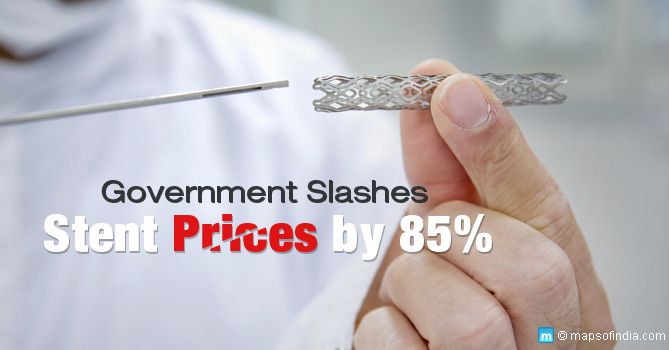In what comes as a major relief to cardiac patients across the country, the Government of India announced its decision to cut the price of coronary stents by about 85 percent. This means that irrespective of taxes and other costs, the maximum retail price (MRP) of metal stents (BMS) will now be capped at Rs 7,623 and drug eluting stents (DES) at Rs 31,080. The announcement came about a week ago and went into immediate effect. Prior to this slash in the price, coronary stents used to cost about Rs 45,000 for BMS and Rs 2 lakh for DES.
CAD in India
A coronary stent is a tube-like mesh that is placed in arteries to prevent them from collapsing and to encourage better blood flow in the heart. There has been a four-fold increase in the prevalence of coronary artery disease (CAD) in India over the past four decades, and the number of angioplasties performed in the country have doubled since 2011. The CAD causes narrowing of arteries in the heart restricting the blood flow. Stents are grafted into the arteries to restore the blood flow.
Initiating The Change
The government initiated the move by adding coronary stents to the National List of Essential Medicines (NLEM). Following this, the National Pharmaceutical Pricing Authority (NPPA), the authority responsible for drug pricing in the country, set the price cap on stents. According to recent news reports, the investigation into the mark-up on stents is believed to have started with a high court petition filed in the year 2014 by Delhi-based lawyer Birender Sangwan. The NPPA later discovered that the unethical mark-up on stents added at each stage of the supply chain resulted in a price hike between 1000-and-2000 percent. Stent boxes often do not carry MRP labels, as well.
Who Adds The Mark-up?
The new MRP notified by NPPA is designed to include an eight percent trade margin – this means that over and above the original costs of the manufacturers and importers, any retailer can benefit from this eight percent margin. The NPPA also said that these stents are supplied directly to hospitals by the manufacturers and no such organised retail channel exists currently. This means that most of the cost mark-up is merely added by hospitals. These medical institutions often refuse to share the packages containing the stents with the insurance companies pointing to some form of malpractice.
Will The Common Man Benefit?
Following the government’s announcement, a few well-known hospital chains have pledged to pass on the benefits of the reduced costs to the common man. On the larger scale, however, fears remain that many hospitals and medical facilities nationwide, may start to overcharge for other procedures. This could be done in an attempt to make up for the loss incurred by lowering stent prices. Currently, there are no ceilings on hospital charges, or operation packages in the country. In fact, according to news reports, some hospitals have already initiated changes to the cost of coronary surgery packages despite insurance companies getting down to discussions for bringing down these costs. This points to a pressing need for pricing regulations in the medical industry.
Targetting Medical Malpractice
There is another benefit that may come from the government’s decision to cap stent prices. Reduction in costs and subsequent reduction in profits will reduce medical malpractice, making it unviable for medical practitioners to take up the stenting surgery in unnecessary cases. The government, thus, has started to take the medical malpractice concern seriously and has launched two mobile apps to address the common man’s grievance – ‘Pharma Jan Samadhan’ and ‘Pharma Sahi Daam’. Complaints can be registered on these applications and swift action shall be taken, promises the NPPA.





